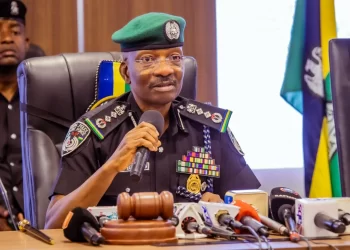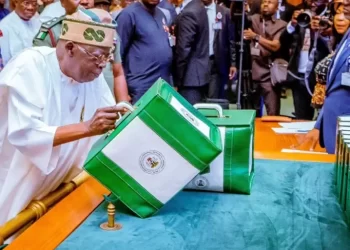Suddenly, there has been a resurgence of positive feelings among Nigerians that the return to the saddle of Muhammadu Buhari, a former military Head of State, will bring some spark into the listless state of the anti-corruption war in the country. Among such enthusiastic Nigerians is Bolaji Akinyemi, a professor of political science and former Minister of External Affairs, who has even gone a step further to proffer suggestions on how to go about cleansing the country of its corruption-tainted image.
To make an impact in the anti-corruption war, Akinyemi believes that Buhari, who takes over the reins as Nigeria’s President on May 29, needs to take steps beyond the ordinary. He is canvassing a constitutional amendment that will deny people standing trial in corruption cases some of the rights and privileges they ordinarily should enjoy.
“First(ly), the amendment should abolish bail in all corruption cases. Secondly, the amendment should abolish the option of fine. Thirdly, those with pending criminal (corruption) cases should not be allowed to run for public office. Fourthly, the prosecution should be allowed to appeal against judges findings of ‘not guilty,’” he enunciated at a recent public lecture.
It is not surprising that the vice-chairman of last year’s National Conference has chosen to advocate a deliberate abridgement of certain fundamental rights of individuals if the government must succeed in its anti-corruption crusade. Efforts in the past to employ the conventional legal approach had failed woefully. And the failure has been traced largely to the abuse and manipulation of legal processes by those whose duty it is to secure conviction of suspects using legal instruments.
This point did not escape the attention of Akinyemi, who said, “When we talk of government, we tend to think of the executive branch. Yet, the Bar and Bench have done more to frustrate anti-corruption cases than the executive.” He also noted the important collaborative role that the law enforcement agents and other anti-corruption agencies have to play for success to be achieved.
Corruption in Nigeria has reached a stage where only extraordinary measures can turn things around. For instance, if there were laws such as the ones Akinyemi is advocating, it would have been practically impossible for a former state governor to obtain a perpetual injunction that has shielded him from investigation or prosecution since his exit from office in 2007. It would also have been easy to convict a former Delta State governor, James Ibori, before he met his Waterloo abroad as a fugitive from justice.
Besides, cases involving those who fraudulently made away with about N2.53 trillion subsidy for questionable fuel imports in 2011 would probably have been successfully prosecuted by now and conviction secured. It would also not have been possible for a legislator, caught in a sting operation while collecting over $600,000 bribe to pervert the course of justice, to continue as a lawmaker in the National Assembly till today.
How can it be explained that corruption cases that started in 2007 are still at the preliminary stages today? Rather than give such cases accelerated hearing, judges, in connivance with lawyers, allow technicalities to bog them down. In some instances, such technicalities are pursued up to the Supreme Court before returning to deal with the substantive matters. This is the main reason a case like that of Chimaroke Nnamani, a former Enugu State governor, is just starting afresh, after he was charged in 2007. It also explains why John Yusuf, a man who was convicted for his role in a N27 billion pension scam, was able to get away with just a N750,000 fine, which he gladly paid up before even stepping out of the dock.
In other parts of the world, asset recovery from corrupt businessmen and public office holders is a standard practice. According to the Head of the United Nations Office on Drugs and Crime, Antonio Maria Costa, it is a ”fundamental principle of the United Nations Convention Against Corruption – the world’s only global anti-corruption instrument.”
Compared to what obtains in other countries, Akinyemi’s proposal is not too drastic. In countries where the effects of corruption are as deleterious as in Nigeria, the consequences for offenders are quite dire – or even draconian. In China, for instance, it is common to punish offenders with the death penalty. This was the case with Zhang Shuguang, deputy chief engineer of the now disbanded China railway ministry, who was found guilty of collecting bribes over a period of 11 years.
Although the death penalty is not applied in Indonesia, the country, like Nigeria, has an anti-corruption agency, Komisi Pemberantasan Korupsi, and special courts for the trial of corruption cases. The Court of Acts of Corruption could sentence offenders to as many as 20 years upon conviction. In fact, two years ago, when the then chairman of the Constitutional Court, Akil Mochtar, was arrested for corruption, there was a clamour for the introduction of the death penalty.
Aside from working with the National Assembly to produce laws that would help in fighting corruption, it has become imperative for Buhari to take a second look at the anti-graft agencies, the Economic and Financial Crimes Commission and the Independent Corrupt Practices and Other Related Offences Commission, with a view to overhauling them for effective performance. The recent flurry of activities by the EFCC and the usual sermons from the ICPC notwithstanding, it has become obvious that they cannot fight corruption as they are currently constituted.
Apart from effecting the right changes, the agencies should also be well funded and given the freedom to perform their duties. Corruption is an evil that must be crushed by punishing offenders heavily. That is the only disincentive that will discourage people from persisting in the act.










































